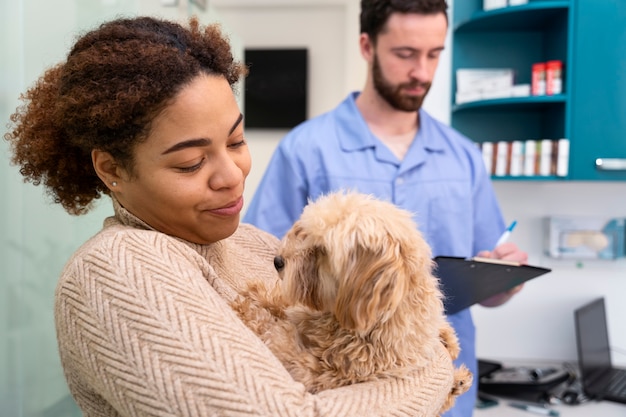Late Summer Pet Care Tips for San Diego Owners


Late Summer Pet Care Tips for San Diego Owners
As the sunny days of late summer continue in San Diego, many pet owners find themselves wondering how to keep their pets safe, healthy, and happy in the heat. Whether you’re exploring local parks in Rancho Peñasquitos, enjoying trails in Carmel Mountain Ranch, or relaxing at home in Black Mountain Ranch, this season brings unique challenges for your furry family members. At The inFURmary, our family-owned veterinary clinic located at 9934 Mercy Rd, Suite 200, San Diego, CA 92129, we understand that late summer fun should never come at the cost of your pet’s wellbeing.
This guide will walk you through essential summer pet care tips tailored to the San Diego climate, including hydration advice, sun safety, activity adjustments, and preventive care. We’ll help you recognize when your pet might be struggling with the heat or other seasonal issues, explain why these risks increase during late summer, and offer practical solutions to keep your companion comfortable. You’ll also learn when it’s time to schedule a wellness examination or reach out to our veterinary team for support. If you’re searching for “vet near me” for reliable San Diego pet health advice, you’ve come to the right place.
For pet owners seeking comprehensive care, our wellness and preventive care exams for pets are designed to keep your pet healthy all year long. Let’s explore how you can make the most of the late summer months while ensuring your pet’s wellbeing remains a top priority.
Recognizing Late Summer Health Issues in San Diego Pets
Signs Your Pet May Be Struggling in the Heat
Late summer in San Diego often brings lingering warmth, and even heat waves, that can put pets at risk for dehydration, overheating, and related health concerns. Knowing the warning signs can help you act quickly to protect your furry companion. Symptoms of heat stress or dehydration include excessive panting, drooling, lethargy, and weakness. Some pets may seek out cool surfaces or shade more than usual, while others might show less interest in play or exercise. You may also notice that your dog’s gums appear dry or sticky, or that your cat is grooming more to try and cool themselves. In more severe cases, vomiting, diarrhea, or unsteady walking can signal dangerous overheating or heatstroke.
Behavioral changes are also important to watch for during late summer. If your dog or cat suddenly avoids outdoor activities they previously enjoyed or seems restless and agitated indoors, it could be a sign of discomfort from the heat. Additionally, pets with existing health conditions, such as heart or respiratory issues, may experience worsened symptoms as the temperature rises.
Environmental Triggers Unique to San Diego
San Diego’s late summer weather often means warm afternoons and cooler mornings, but sudden spikes in temperature are not uncommon. The region’s dry air can accelerate dehydration, especially during periods of low humidity. Local allergens, like dust and pollen, tend to peak during late summer, which may cause sneezing, watery eyes, or skin irritation in sensitive pets. Outdoor hazards, such as hot pavement or increased exposure to fleas and ticks, can pose additional risks.
Knowing these local factors will help you identify when your pet might need extra care or a change in routine. If you notice any combination of the symptoms mentioned above, it’s time to take proactive steps to safeguard your pet’s health.
Understanding Why Late Summer Risks Increase
The Science Behind Heat and Pet Physiology
Pets are not as efficient as humans when it comes to cooling themselves. Dogs primarily cool off by panting, while cats rely on grooming and limited sweat glands in their paws. As temperatures climb in late summer, these natural cooling mechanisms can quickly become overwhelmed, especially in brachycephalic breeds (those with short noses), senior pets, puppies, and those with chronic medical conditions. The heat can cause internal body temperatures to rise, making pets more susceptible to dehydration and heat-related illnesses.
Humidity, although often mild in San Diego, can also interfere with your pet’s ability to release heat. When the air is saturated with moisture, panting becomes less effective, leading to a rapid buildup of body heat. Even shaded outdoor areas can be deceptively warm, and pavement or sand can remain hot well into the evening, putting paws at risk for burns or blisters.
Late Summer Activity Patterns and Environmental Hazards
During late summer, many families enjoy outdoor activities with their pets, from beach outings to backyard barbecues. While these adventures are fun, they can increase your pet’s risk for heat exhaustion, insect bites, and accidental ingestion of harmful foods or plants. Flea and tick populations tend to surge during the warmest months, raising the risk of parasite-related diseases. Standing water in parks or yards can harbor bacteria or parasites, which may cause gastrointestinal upset if ingested.
In San Diego and surrounding communities, wildfire smoke and air quality concerns can also impact pets with respiratory sensitivities. Keeping these local environmental factors in mind is key to providing optimal San Diego pet health advice for this season.
Professional Veterinary Care for Late Summer Wellness
How Our Team Supports Your Pet’s Summer Health
At The inFURmary, our veterinary team is dedicated to helping pets thrive during every season. Routine wellness examinations are a cornerstone of preventive care, allowing us to detect early signs of dehydration, allergies, or other summer-related issues before they escalate. During a comprehensive pet exam, we assess hydration status, check for skin abnormalities, and review your pet’s parasite prevention plan.
If your pet develops symptoms of heat exhaustion or dehydration, our diagnostic laboratory services in San Diego allow us to run quick bloodwork and urinalysis to evaluate organ function and electrolyte balance. In cases where we suspect heartworm or tick-borne diseases, we may recommend additional screening to ensure your pet receives the best possible treatment.
For pets already showing signs of discomfort or pain due to the heat or increased physical activity, our advanced pain management options can provide relief and support recovery. Pets who spend more time outdoors in the summer may also benefit from a dental checkup, as chewing on sticks or debris can cause oral injuries that are often overlooked.
The Importance of Parasite Prevention in Late Summer
Fleas, ticks, and heartworms are especially active during San Diego’s late summer. Our veterinary team can help you develop a customized parasite prevention strategy based on your pet’s lifestyle and risk factors. This often involves regular use of vet-approved preventives, routine screenings, and education on minimizing environmental exposure.
If you are searching for “veterinary services near me” to address summer-specific health concerns, our team is here to support your pet’s unique needs.
Home Care Strategies for Late Summer Pet Health
Keeping Your Pet Hydrated and Comfortable
Consistent access to fresh, cool water is essential during the warmer months. Refill water bowls frequently and consider adding ice cubes for extra cooling. When heading out for walks or hikes, always bring a portable water source for your pet and encourage short breaks in shady spots. Avoid walking your dog during peak afternoon heat; instead, choose early mornings or late evenings when surfaces are cooler.
Grooming adjustments can also make a difference. Brushing your pet regularly helps remove excess fur and improves air circulation against the skin, reducing the risk of overheating. However, avoid shaving double-coated breeds, as their fur provides natural insulation against both heat and sunburn.
Sun Safety and Activity Adjustments
Sun protection is not just for humans. Light-colored pets or those with thin coats are at higher risk for sunburn. You can use pet-safe sunscreens on vulnerable areas like noses and ear tips, but always consult your veterinarian before trying a new product. Limit outdoor activities during high UV hours and provide shaded rest areas when spending time outside.
If your pet enjoys swimming, rinse them thoroughly after each dip to remove salt, chlorine, or bacteria that can irritate skin and ears. Monitor your pet for ear scratching or head shaking, which may indicate an infection requiring veterinary attention.
Parasite and Allergen Control at Home
Keep your yard tidy to minimize flea and tick habitats. Regularly wash pet bedding and vacuum carpets to reduce allergen buildup. For pets prone to seasonal allergies, wiping paws and fur with a damp cloth after outdoor play can help remove pollen and dust. Ask your veterinarian about safe antihistamines or topical treatments if your pet develops persistent itching or skin redness.
If you would like more information about keeping your pet protected from seasonal threats, our education library offers additional San Diego pet health advice and home care tips.
When to Schedule a Veterinary Visit
Recognizing When Professional Help Is Needed
While many late summer pet care strategies can be managed at home, certain symptoms require immediate attention from a veterinary professional. If your pet experiences persistent vomiting, diarrhea, rapid breathing, confusion, or collapses, seek veterinary care as soon as possible. Other warning signs include refusal to drink water, noticeable changes in gum color (such as pale or blue-tinged gums), or unresponsiveness.
Pets with chronic health conditions, such as diabetes, heart disease, or kidney issues, should be monitored closely during warm weather, as they are more vulnerable to complications. Scheduling a preventive checkup before or during late summer allows our veterinarians to identify any health risks and tailor recommendations for your pet’s specific needs.
If you are searching for a “quality vet near me” to provide reliable care in San Diego, our veterinary team is skilled in identifying and treating a variety of summer-related pet health concerns.
Building a Preventive Care Plan
Our approach to summer pet care tips focuses on building a lasting partnership with you and your pet. We recommend annual wellness examinations, timely vaccinations, and year-round parasite prevention as foundational elements of a strong preventive care program. By working together, we can help your pet enjoy every season to the fullest while minimizing health risks.
Your Next Steps for Late Summer Pet Wellness in San Diego
As you make memories with your pet during the final weeks of summer, remember that a little planning goes a long way toward ensuring their comfort and safety. Keep an eye out for signs of heat stress, stay proactive about hydration and parasite prevention, and adjust outdoor activities to accommodate the San Diego weather.
If you have questions, notice any concerning symptoms, or want to schedule a wellness examination, don’t hesitate to reach out. Our family-owned clinic at 9934 Mercy Rd, Suite 200, San Diego, CA 92129 is committed to providing compassionate, comprehensive care for pets in San Diego and surrounding communities. Contact our veterinary team today at (858) 284-1001 to book your appointment, or explore our wellness and preventive care exams for pets for more details. When you search for a “vet near me” who truly cares, The inFURmary is here to help you and your pet thrive throughout every season.
For more detailed San Diego pet health advice and late summer pet care tips, visit our education library or call us directly. We look forward to partnering with you in your pet’s lifelong health and happiness.
This article is for informational purposes only and is not a substitute for professional veterinary care. If you have specific concerns about your pet’s health, please consult your veterinarian.



















